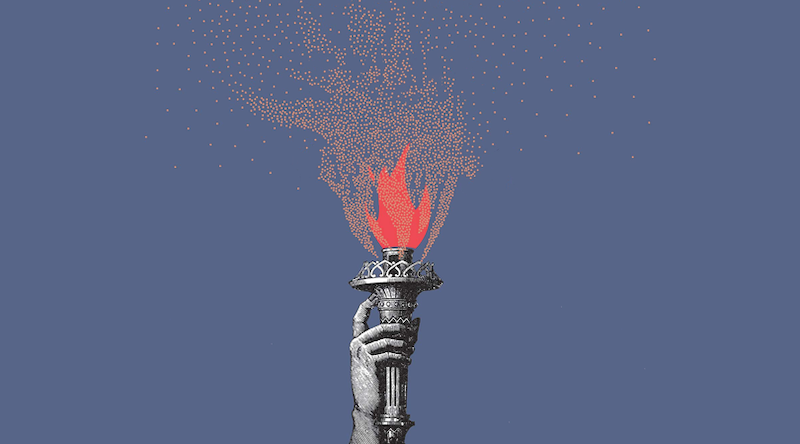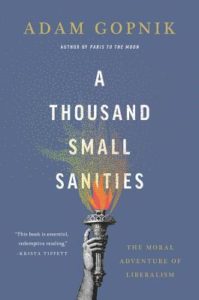
We’re putting an eclectic mix of genres under the microscope for you this week, folks; from true crime to autofiction, sci-fi to political science, and more.
First up, it’s Michael Lewis’ New York Times review of Furious Hours: Murder, Fraud, and the Last Trial of Harper Lee, in which the Moneyball author writes “Casey Cep has picked up where Lee left off: She’s written the true-crime story that Harper Lee never figured out how to write. But she’s used it as an excuse to study Lee herself—and the reasons for her long silence.”
Over at the New Yorker, National Book Award-winning author Joyce Carol Oates considers Exhalation, the long-awaited follow-up collection from humanist sci-fi master Ted Chiang: “When an entire story is metaphorical, focussed on a single surreal image, it’s helpful that individual sentences possess the windowpane transparency that George Orwell advocated as a prose ideal.”
Meanwhile, in his New Republic piece on Adam Gopnik’s A Thousand Small Sanities: The Moral Adventure of Liberalism, David Sessions criticizes Gopnik’s attempt “to spin bourgeois bohemianism into a grand theory of liberalism.” “The rapid degradation of the planet has made radicalism rational and incrementalism a kind of civilizational death drive,” writes Sessions, “In this context, Gopnik’s blissful ignorance reads not as comical but as deeply sinister.”
We’ve also got Parul Sehgal on Rachel Louise Snyder’s “extraordinary” No Visible Bruises: What We Don’t Know About Domestic Violence Can Kill Us (“In its scope and seriousness—its palpable desire to spur change—this book invites reflection not only about violence but about writing itself”) and Gabino Iglesias’ NPR review of Juliet the Maniac, Juliet Escoria’s harrowing autofictional portrait of mental illness and self-harm.
*
“Casey Cep has picked up where Lee left off: She’s written the true-crime story that Harper Lee never figured out how to write. But she’s used it as an excuse to study Lee herself—and the reasons for her long silence … It’s one measure of just how rich Casey Cep’s material is, and how artfully she handles it, that I have given away only about a tenth of the interest and delight contained within just the first third or so of her book. She reminded me all over again how much of good storytelling is leading the reader to want to know the things you are about to tell him, while still leaving him to feel that his interest was all his idea. By the time I got to the section on Harper Lee, I wanted to know more about her than I’ve ever thought I wanted to know … Furious Hours builds and builds until it collides with the writer who saw the power of Maxwell’s story, but for some reason was unable to harness it. It lays bare the inner life of a woman who had a world-class gift for hiding … it’s in her descriptions of another writer’s failure to write, that [Cep’s] book makes a magical little leap, and it goes from being a superbly written true-crime story to the sort of story that even Lee would have been proud to write.”
–Michael Lewis on Casey Cep’s Furious Hours: Murder, Fraud, and the Last Trial of Harper Lee (The New York Times Book Review)
“Chiang again presents elaborate thought experiments in narrative modes that initially seem familiar. Contemporary issues relating to bioethics, virtual reality, free will and determinism, time travel, and the uses of robotic forms of A.I. are addressed in plain, forthright prose. If Chiang’s stories can strike us as riddles, concerned with asking rather than with answering difficult questions, there is little ambiguity about his language. When an entire story is metaphorical, focussed on a single surreal image, it’s helpful that individual sentences possess the windowpane transparency that George Orwell advocated as a prose ideal … irony is sparse in Ted Chiang’s cosmology. It is both a surprise and a relief to encounter fiction that explores counterfactual worlds like these with something of the ardor and earnestness of much young-adult fiction, asking anew philosophical questions that have been posed repeatedly through millennia to no avail. Chiang’s materialist universe is a secular place, in which God, if there is one, belongs to the phenomenal realm of scientific investigation and usually has no particular interest in humankind. But it is also a place in which the natural inquisitiveness of our species leads us to ever more astonishing truths, and an alliance with technological advances is likely to enhance us, not diminish us. Human curiosity, for Chiang, is a nearly divine engine of progress.”
–Joyce Carol Oates on Ted Chiang’s Exhalation (The New Yorker)

“A Thousand Small Sanities tries to spin bourgeois bohemianism into a grand theory of liberalism, explaining why radical politics are both unnecessary and dangerous. The setting for these admonitions is a comfortable liberal family, as Gopnik pretends every once in a while that he is addressing his arguments to his (presumably) left-leaning college-age daughter, Olivia…Gopnik’s attempt to convert her instead to the bare-minimum politics of the late twentieth century frequently lapses into parody and unwittingly exposes the emptiness of the old liberal orthodoxy … What these examples reveal is the deepest failing of Gopnik’s style of thinking and the old liberal consensus it parodies: Enclosed in the idealized history of political thought and the ideologized conflict between political ‘systems,’ it lacks a fundamental understanding of how political-economic power shaped the last two centuries. It is unable to give even a basic account of how liberal capitalism reshaped the globe and established a succession of imperial orders (British, then American) at incalculable human and environmental cost … We might not have expected much more from Gopnik, but A Thousand Small Sanities’ aimless joyride of free-associated clichés and its stubborn refusal to look at reality may indicate more broadly how little the American establishment has learned since the turn of the century. The climate crisis, more than anything, has highlighted the inadequacy of the liberal orthodoxy’s self-congratulatory moderation and celebration of glacial incrementalism. It poses, in stark terms, the need for dramatic action and the inescapability of confronting the powerful interests behind the deadly carbon economy. The rapid degradation of the planet has made radicalism rational and incrementalism a kind of civilizational death drive. In this context, Gopnik’s blissful ignorance reads not as comical but as deeply sinister. ”
–David Sessions on Adam Gopnik’s A Thousand Small Sanities: The Moral Adventure of Liberalism (The New Republic)
“…a powerful mix of biography, exploration of mental illness, and fragments of a nightmare journal of the space between girlhood and womanhood … Some parts could be confused with fiction, when Escoria is writing about hallucinations, but the narrative is full of letters, notes, and even patient logs that make it more of a detailed memoir, spanning two tumultuous years in Escoria’s life … an honest, harrowing book that deals with addiction and mental illness while also showing the changing ways in which teenagers experience life. Escoria never sugarcoats any of it. Instead, she shares everything, showing readers how humans can be broken in strange ways that no amount of therapy and medication can fix. It also offers a glimpse into the nightmarish lives of those with profoundly damaged psyches … Escoria earns the readers’ trust early, and that helps her story feel like a continuous gut punch, a 336-page attack on the senses that makes readers suffer whenever Escoria suffers, until they’re as confused as she is … a necessary read … a heartfelt, raw, powerfully told story about surviving mental illness and learning to cope with inner demons. Escoria is a talented writer who’s not afraid to write her truth, even when it will scrape viciously at the souls of readers. This book hurt, but by the last page all I wanted was to give the author a hug and thank her for sharing.”
–Gabino Iglesias on Juliet Escoria’s Juliet the Maniac (NPR)
“Between 2000 and 2006, 3,200 American soldiers were killed in combat. During that same period, in the United States, more than three times as many women died at the hands of their husbands and boyfriends. In her extraordinary new book, No Visible Bruises, Rachel Louise Snyder reports on what the World Health Organization has called ‘a global health problem of epidemic proportions’ … This book takes apart the myths that surround domestic violence, many of which Snyder herself once believed: Restraining orders and shelters are always effective responses. Abusers never change. Visible signs of violence point to the greatest threat … In its scope and seriousness—its palpable desire to spur change—this book invites reflection not only about violence but about writing itself. What kinds of reportage really move policy? What kinds of narrative—what sorts of tone, structure, examples—can stoke a reader’s outrage and then translate that outrage into action, keeping it from curdling into cynicism or despair? This is the interesting paradox of this particular genre. Books that want to raise an alarm don’t don’t always aspire to literature, but to be effective—to persuade—they must be literary; they must be obsessed with matters of rhythm, form and language … She brings all of fiction’s techniques to this new book—canny pacing, an eye for the animating detail and bursts of quick, confident characterization. There is a fullness and density to every one of her subjects—the former prison guard turned restorative justice advocate, the notorious pimp who now holds antiviolence classes for abusers. She glides from history to the present day, from scene to analysis, with a relaxed virtuosity that filled me with admiration. This is a writer using every tool at her disposal to make this story come alive, to make it matter.”
–Parul Sehgal on Rachel Louise Snyder’s No Visible Bruises: What We Don’t Know About Domestic Violence Can Kill Us (The New York Times)
If you buy books linked on our site, Lit Hub may earn a commission from Bookshop.org, whose fees support independent bookstores.

